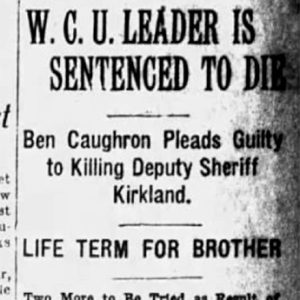calsfoundation@cals.org
Polk County Draft War
The Polk County Draft War was the first of five documented episodes of armed resistance to the draft in Arkansas during World War I (four of which were violent). The Selective Service Act of 1917 introduced forced conscription to Arkansas, but efforts to apprehend and/or punish draft evaders did not begin in earnest until the spring of 1918, likely due to a greater demand for military manpower. The ensuing crackdown on draft evasion sparked a series of so-called draft wars, brief episodes of armed defiance by close-knit family groups against authorities. These acts of resistance often occurred in isolated, mountainous regions of the state, where socialism and/or organized labor had found purchase.
On May 25, 1918, Sheriff H. W. Finger of Polk County assembled a posse in Mena (Polk County) to apprehend a gang of evaders in the surrounding countryside. The following morning, the posse surrounded the home of one of the evaders, Robert Harkey, and a shootout ensued, leaving one posse member wounded and Deputy Sheriff Charles Kirkland dead. The presumed leader of the resisters, Elmer Cason During, was killed in the gunfight. One resister, Ben Caughron, was apprehended in the house, with the rest of the gang surrendering to the posse by the end of the day.
Caughron was speedily convicted of resisting arrest and the willful murder of Charles Kirkland. He was sentenced to death in the electric chair. Caughron’s brothers, Lon and Edward, were given fifteen years in prison and a life sentence, respectively. Robert Harkey received sixteen years, while various other members of the gang also received lengthy sentences. No exact figures were given as to the number of members of this group, though at least five were specifically named in reports. Oddly, none of the Caughron gang was tried on charges of resisting the draft, as the trials occurred in state, rather than federal, courts. This pattern would persist in several other draft resistance cases.
Governor Charles Brough was petitioned to execute Caughron as soon as possible. He visited Caughron’s cell and, after a lengthy interview, decided not to intervene in the case either way. Caughron had several interviews with the Arkansas Gazette during the summer he was imprisoned before his hasty execution in August 1918; in these interviews, he declared that a lifelong commitment to socialism was, at least in part, the cause of his resistance to conscription: “I was born into a Socialist family and brought up on Socialist teachings. I have been reading the Appeal to Reason since I was fourteen….Every day of hard labor I put in, out of which I received only a small percentage of the actual yield, confirmed me in the Socialistic beliefs in which I had been brought up. When the war broke out, it was my conviction that it was a rich man’s war.”
Caughron’s views on socialism reflect a poor, or at least unsophisticated, understanding of the concept, particularly his citation of the Appeal to Reason, a prominent socialist periodical at the time (and one often cited by draft resisters). The publication had actually thrown its support behind President Woodrow Wilson in December 1917 and urged its readers to cooperate with the draft. Further statements Caughron made seemed to indicate that he and his group’s resistance was more cultural than political, as the kin-based “mountain folk” had always been defiant of central authority. He said: “If we had been shown by people we know that the draft was for the nation’s good, that it was not forcing us to war for rich men’s profits, we would have gone….You can’t force mountain men. You can’t force anybody who is not afraid to die, and the mountaineers are not afraid to die.”
Ben Caughron was executed on August 23, 1918.
For additional information:
“Ben C. Caughron Pleads Guilty.” Mena Evening Star, June 17, 1918, p. 1.
“Ben Caughron Has Paid Final Debt.” Mena Evening Star, August 23, 1918, pp. 1, 2.
“Caughron Resigned to Death in Electric Chair.” Arkansas Gazette, August 22, 1918, p. 12.
“Death Penalty for Ben Caughron,” Mena Evening Star, June 18, 1918, pp. 1, 4.
“From Death Cell He Warns against Disloyal Agitators.” Arkansas Gazette, July 6, 1918, p. 1.
“How the Sheriff of Polk County Broke up the Red Flag Gang.” Arkansas Gazette, May 31, 1918, p. 8.
“Polk County Officers In Battle With Outlaws,” Mena Evening Star, May 25, 1918, p. 1.
Sealander, Judith. “Draft Resistance in Arkansas to World War I” Ozark Historical Review 2 (1973): 1–12.
Phillip C. Stephens
University of Arkansas, Fayetteville
 Early Twentieth Century, 1901 through 1940
Early Twentieth Century, 1901 through 1940 Military
Military Polk County Draft War Article
Polk County Draft War Article 




Comments
No comments on this entry yet.